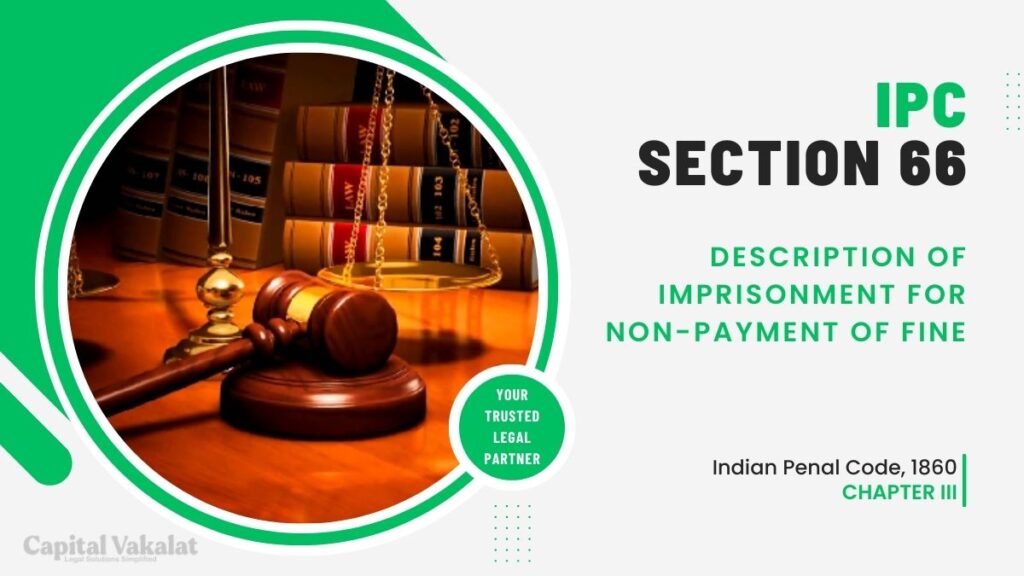In the realm of criminal law, the Indian Penal Code (IPC) stands as the backbone, outlining various offenses and their corresponding penalties. Section 66 of the IPC delves into a specific aspect of punishment, shedding light on the repercussions faced by individuals who fail to pay fines imposed upon them by the judiciary.

In this comprehensive article, we will explore the intricacies of Section 66 IPC, its implications, and the legal nuances surrounding imprisonment for non-payment of fines.
Understanding Section 66 IPC
What is Section 66 IPC?
Section 66 of the Indian Penal Code deals with the consequences of non-payment of a fine imposed as part of a sentence. It specifies the circumstances under which imprisonment can be ordered in cases of non-compliance with fines.
The Role of Fines in Criminal Sentencing
Before delving into the details of Section 66 IPC, it’s crucial to understand the significance of fines in the realm of criminal sentencing. Fines are a common form of punishment that serves both punitive and restitutive purposes.
When Does Section 66 IPC Apply?
Section 66 IPC comes into play when an individual is convicted of a criminal offense and a fine is levied as part of their sentence. This can occur in a wide range of criminal cases, from minor infractions to more serious crimes.
The Consequences of Non-Payment
Now, let’s explore what happens when an individual fails to pay the fine imposed by the court.
Imprisonment for Non-Payment
Initiating Imprisonment
When a person is unable or unwilling to pay the fine within the stipulated time frame, the court may issue a warrant for their arrest. This marks the beginning of the process of imprisonment for non-payment.
Duration of Imprisonment
The duration of imprisonment for non-payment of a fine varies depending on the amount of the fine and the seriousness of the offense. The court has the discretion to determine the length of the sentence.
Alternatives to Imprisonment
In some cases, the court may provide alternatives to imprisonment for non-payment, such as community service or probation. These alternatives aim to strike a balance between enforcing the law and rehabilitating the offender.
Legal Safeguards and Appeals
Rights of the Convicted Individual
It’s essential to be aware that individuals facing imprisonment for non-payment of fines still possess certain legal rights, including the right to legal representation and the right to appeal the court’s decision.
The Appeals Process
The appeals process allows convicted individuals to challenge the court’s decision regarding the imposition of fines and imprisonment. This ensures that justice is served fairly.
Conclusion
In summary, Section 66 IPC plays a vital role in the Indian legal system by regulating the consequences of non-payment of fines imposed as part of criminal sentences. It highlights the need for individuals to fulfill their legal obligations promptly to avoid imprisonment.
FAQs
Is there a specific time frame for fine payment in Section 66 IPC?
Section 66 IPC does not specify a fixed time frame for fine payment. It is typically determined by the court and may vary based on the circumstances.
Can I appeal against a fine imposed on me?
Yes, individuals have the right to appeal against fines and imprisonment orders. Consult with legal counsel for guidance on the appeals process.
Are there any exceptions to imprisonment for non-payment of fines?
Yes, in certain cases, the court may offer alternatives to imprisonment, such as community service or probation, as a way to address non-payment of fines.
What should I do if I cannot afford to pay the fine imposed on me?
If you cannot afford to pay the fine, it is essential to communicate your financial situation to the court. They may consider your circumstances and provide options for payment or alternatives to imprisonment.